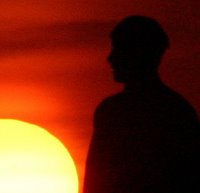My town of Craftsbury Vermont is too small to have its own newspaper. Summer-folk and flatlanders sometimes manage to get their hands on day-old copies of the New York Times, but for most locals, the real paper arrives on Wednesday, when the Hardwick Gazette hits the news stands.
The Gazette doesn't quite stack up to Fox News and CNN. Check out the top stories this week -
1) Mrs. Nichol's water sometimes runs brown and she can't get the town of Hardwick to fix it for her.
2) Pat McCoy doesn't want snowmobilers and ATV riders using the part of an old railbed that runs through his property.
and the last headline on the front page...
3) Students Welcomed With Special Spirit on First Day (of school).
I'm used to figuring out what's going on in the world by using my computer to access newspapers like the New York Times or the Washington Post, or by browsing the big news magazines, like Time and The Economist. Usually, I pass over small town papers like the Hardwick Gazette, which can sometimes sound like a bunch of senile farmers agreeing that while it sure is raining now, there's a good chance things might clear up by tomorrow. But over the past month, with the time to slow things down a pace, I'm beginning to realize that there are a lot of interesting stories in small communities like ours. The miniature dramas that play out in the pages of local papers can tell you a lot about the what's going on both in the region and across the nation as a whole. By paying attention to the details brought out in pages that, at first glance seem devoid of real news, you can practically get a finger on America's pulse.
For example, one of the stories that made the front page of the Gazette last week concerns the issue of how the people of Cabot will vote on town matters in the coming years. Now, Cabot is a real small place, and if they didn't happen to make the best cheddar cheese in the world right there in town, you never would've heard of it. This little article about procedural change in local politics seems practically irrelevant and hopelessly uninteresing next to JonBenet Ramsey headlines and photos of bombed-out Beirut apartments.
But let's look a little closer. Check out this letter to the Editor - I love the "intrusion of confusion" bit.
"Voters beware! The specter of democracy looms, once again, over Cabot! The chance to deliberate the issues in rational debate outside the staged rally of town meeting where a voice vote means the loudest voice wins. The opportunity to actually think about that which directly affects everyone minus the intrusion, confusion, deception (ouch), obfuscation and distraction, and minus an unprepared, uninformed, inept (double ouch!) moderator..."
Wow. Now that's a wicked great letter, biting, intelligent, sarcastic and full of passion. I didn't retype the whole thing, but know that the Voting Rights Act gets quoted at the end. A lot.
As it turns out, this boring and trivial piece of news actually dows get someone's juices flowing. It's a quiver in the pulse, and it's symptomatic something important about this part of Vermont.
First of all, the economy isn't so hot. Working families with kids in school can't do much better than scrape by. These folks, many of whom have deep roots in their communities, are being outnumbered by more recent arrrivals, people who made enough money elsewhere to buy property and move to an idyllic part of America. In towns like Cabot, the whole social demographic is slowly but surely changing.
Most of the flatlanders like most things about the small towns they've moved into - after all, they chose to live there. There are a few cultural clashes, most manifesting themselves during deer season, but generally speaking everyone gets along fine. It helps, of course, that the newcomers pay a lot in taxes, helping support local governments that would otherwise be hard pressed to pay the bills.
The problem, is that the newcomers and longtime residents alike see their tax dollars going to things, especially schools, that seem unnecessary and wasteful - in light of the changing demographics. It's a vicious cycle. There's less need for small town schools when only eight or nine kids are graduating every spring, and when parents start to see their kids struggling with limited options, the bigger schools in towns a drive away start to look a lot more attractive. Before you know it, another working family with high-school age kids has sold the farm to retirees from Connecticut and moved to a bigger town.
So how does this all tie together? Gotta hit the road. But I'll get to it later this week.

